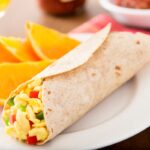Fueling an active lifestyle with a vibrant, plant-based diet can seem challenging, but it’s entirely achievable. This guide dives deep into the world of high-protein vegan meals, offering practical strategies and delicious recipes to help athletes and active individuals thrive. We’ll explore the best vegan protein sources, delve into meal planning techniques, and equip you with the knowledge to craft balanced, energizing meals that support peak performance.
Imagine a world where your workouts are fueled by delicious, nutritious plant-based meals, leaving you feeling energized and strong. This isn’t a dream; it’s a reality achievable through mindful meal planning and a deep understanding of vegan protein sources. We’ll uncover the secrets to optimizing macronutrient intake, managing hunger, and maintaining energy levels throughout your day, all while enjoying a diverse and flavorful diet.
Recipe Ideas

Fueling an active vegan lifestyle requires strategic meal planning to ensure sufficient protein intake. The following recipes offer delicious and nutritious options packed with plant-based protein to support your energy levels and muscle recovery. Each recipe provides a balanced combination of macronutrients, contributing to overall health and well-being.
High-Protein Vegan Lentil Shepherd’s Pie
Ingredients:
- 1 tbsp olive oil
- 1 large onion, chopped
- 2 carrots, chopped
- 2 celery stalks, chopped
- 1 cup brown or green lentils, rinsed
- 4 cups vegetable broth
- 1 tsp dried thyme
- 1 tsp dried rosemary
- 1/2 tsp salt
- 1/4 tsp black pepper
- 2 cups mashed sweet potatoes (about 2 large sweet potatoes, baked and mashed with a little plant-based milk and salt)
Instructions:
- Heat olive oil in a large pot over medium heat. Add onion, carrots, and celery and cook until softened, about 5-7 minutes.
- Stir in lentils, vegetable broth, thyme, rosemary, salt, and pepper. Bring to a boil, then reduce heat and simmer for 25-30 minutes, or until lentils are tender.
- Preheat oven to 375°F (190°C).
- Pour lentil mixture into a baking dish. Top with mashed sweet potatoes.
- Bake for 20-25 minutes, or until heated through and the top is lightly browned.
Nutritional Information (per serving, approximate):
Calories: 350-400; Protein: 15-20g; Carbohydrates: 60-70g; Fat: 5-10g
High-Protein Tofu Scramble with Spinach and Mushrooms
Ingredients:
- 1 block (14 oz) extra-firm tofu, crumbled
- 1 tbsp olive oil
- 1/2 onion, chopped
- 8 oz mushrooms, sliced
- 5 oz fresh spinach
- 1/4 cup nutritional yeast
- 1 tsp turmeric
- 1/2 tsp garlic powder
- Salt and pepper to taste
Instructions:
- Heat olive oil in a large skillet over medium heat. Add onion and mushrooms and cook until softened, about 5 minutes.
- Add crumbled tofu, nutritional yeast, turmeric, and garlic powder. Cook for 5-7 minutes, stirring occasionally, until tofu is heated through and slightly browned.
- Stir in spinach and cook until wilted, about 2 minutes.
- Season with salt and pepper to taste.
Nutritional Information (per serving, approximate):
Calories: 250-300; Protein: 20-25g; Carbohydrates: 15-20g; Fat: 10-15g
High-Protein Vegan Black Bean Burgers
Ingredients:
- 1 (15-ounce) can black beans, rinsed and drained
- 1/2 cup cooked quinoa
- 1/4 cup chopped onion
- 1/4 cup chopped bell pepper
- 1/4 cup rolled oats
- 1 tablespoon chili powder
- 1 teaspoon cumin
- 1/2 teaspoon garlic powder
- Salt and pepper to taste
Instructions:
- Mash black beans with a fork until mostly smooth, leaving some texture.
- In a large bowl, combine mashed black beans, quinoa, onion, bell pepper, oats, chili powder, cumin, garlic powder, salt, and pepper.
- Mix well to combine.
- Form mixture into 4 patties.
- Cook patties in a lightly oiled skillet over medium heat for 5-7 minutes per side, or until heated through and browned.
Nutritional Information (per serving, approximate):
Calories: 200-250; Protein: 12-15g; Carbohydrates: 30-40g; Fat: 5-8g
High-Protein Vegan Smoothie
This smoothie combines ingredients rich in protein, fiber, and essential nutrients to provide sustained energy and support muscle recovery. The addition of spinach provides vital vitamins and minerals. Chia seeds contribute to a thicker consistency and add omega-3 fatty acids.
Ingredients:
- 1 cup unsweetened almond milk
- 1 scoop vegan protein powder (pea, soy, or brown rice protein)
- 1/2 cup frozen berries (mixed berries are ideal)
- 1/4 cup spinach
- 1 tablespoon chia seeds
- 1/2 banana (for sweetness and potassium)
Instructions:
Combine all ingredients in a blender and blend until smooth. Adjust liquid as needed to achieve desired consistency.
Nutritional Benefits:
This smoothie is a powerhouse of nutrients. The vegan protein powder provides essential amino acids for muscle building and repair. Berries are rich in antioxidants. Spinach offers iron and vitamins A and C. Chia seeds provide fiber and omega-3 fatty acids. The banana adds potassium, an essential electrolyte for muscle function.
High-Protein Vegan Stir-Fry
A versatile and customizable dish, this stir-fry allows for a wide variety of vegetable and protein source combinations. The key is to use firm, high-protein vegetables and a good source of plant-based protein like tofu or tempeh.
Ingredients:
- 1 block (14 oz) firm or extra-firm tofu, pressed and cubed (or 8 oz tempeh, cubed)
- 1 tbsp olive oil
- 1 red bell pepper, sliced
- 1 green bell pepper, sliced
- 1 cup broccoli florets
- 1 cup snow peas
- 1/2 cup sliced mushrooms
- 1/4 cup soy sauce (or tamari for gluten-free)
- 2 tbsp cornstarch
- 1 tbsp sesame oil
- 1 tbsp rice vinegar
Instructions:
- Marinate tofu or tempeh in soy sauce for at least 15 minutes.
- Heat olive oil in a wok or large skillet over high heat.
- Add tofu/tempeh and stir-fry until browned on all sides.
- Add bell peppers, broccoli, snow peas, and mushrooms. Stir-fry for 3-5 minutes, until vegetables are tender-crisp.
- In a small bowl, whisk together cornstarch, remaining soy sauce, sesame oil, and rice vinegar.
- Pour sauce over stir-fry and cook for 1-2 minutes, or until sauce has thickened.
Vegetable and Protein Combinations:
Experiment with different vegetables such as bok choy, carrots, zucchini, and asparagus. Other protein sources include edamame, lentils, or chickpeas.
Addressing Nutritional Deficiencies
Maintaining a balanced and nutritious vegan diet is crucial for athletes, as it directly impacts performance, recovery, and overall health. While a well-planned vegan diet can provide all necessary nutrients, some specific deficiencies are more common among vegans than omnivores, requiring careful attention and proactive strategies. Understanding these potential deficiencies and implementing effective solutions is key to maximizing athletic potential.
A vibrant, varied vegan diet, rich in whole foods, is the cornerstone of preventing nutritional deficiencies. However, certain nutrients require particular attention. These include vitamin B12, iron, calcium, and omega-3 fatty acids. Failing to address these potential shortfalls can significantly hinder athletic performance and overall well-being. The following sections detail these critical nutrients and provide practical strategies for ensuring adequate intake.
Vitamin B12 Deficiency and Solutions
Vitamin B12 is crucial for red blood cell formation, nerve function, and energy production—all essential for athletic performance. Unlike other vitamins, B12 isn’t readily found in plant-based foods. A deficiency can lead to fatigue, weakness, and impaired cognitive function, severely impacting training and competition. Therefore, supplementation is generally recommended for vegans. This can be achieved through a daily B12 supplement, fortified foods like nutritional yeast or plant-based milks, or regular intake of B12-containing shots or lozenges. Choosing a high-quality B12 supplement, such as methylcobalamin or adenosylcobalamin, ensures optimal absorption. Regular blood tests can monitor B12 levels and guide supplementation strategies.
Iron Intake and Bioavailability
Iron plays a vital role in oxygen transport throughout the body, directly impacting endurance and stamina. While plant-based foods contain iron, it’s in a less readily absorbed form (non-heme iron) compared to the iron found in animal products (heme iron). This means vegans need to consume significantly more iron to meet their needs. Excellent sources include lentils, spinach, tofu, and fortified cereals. Crucially, combining iron-rich foods with vitamin C-rich foods, such as citrus fruits or bell peppers, significantly enhances iron absorption. For example, a spinach and lentil salad with a lemon vinaigrette is a highly bioavailable source of iron. Regular blood tests can identify iron deficiency anemia, which is easily treated with supplementation if needed.
Calcium Sources for Strong Bones and Muscles
Calcium is essential for strong bones and muscle function, both critical for athletes. Dairy products are a primary source of calcium for non-vegans, but vegans can obtain adequate calcium from various plant-based sources. Leafy green vegetables like kale and collard greens, fortified plant milks, tofu, and calcium-set tofu are excellent choices. However, it is important to note that the bioavailability of calcium from plant sources can vary depending on factors like oxalic acid content in some vegetables. Therefore, a diverse intake of calcium-rich foods is recommended. Regular consumption of calcium-rich foods, coupled with sufficient vitamin D (crucial for calcium absorption), is vital for maintaining bone health and preventing stress fractures.
Omega-3 Fatty Acid Intake for Anti-Inflammation and Recovery
Omega-3 fatty acids, particularly EPA and DHA, are essential for reducing inflammation, supporting heart health, and aiding in muscle recovery. While omega-3s are found in flaxseeds, chia seeds, and walnuts, they are in the form of ALA, which the body converts to EPA and DHA at a relatively low rate. Therefore, vegans may benefit from supplementing with algae-based DHA or EPA, which directly provides these essential fatty acids. Including these omega-3 sources, alongside a diet rich in fruits, vegetables, and whole grains, provides a comprehensive approach to managing inflammation and promoting optimal recovery after intense training.
Embarking on a high-protein vegan journey for an active lifestyle is a rewarding experience, empowering you to fuel your body with wholesome plant-based foods while maximizing athletic performance. By understanding the nuances of protein bioavailability, crafting balanced meal plans, and experimenting with diverse and exciting recipes, you’ll discover a world of delicious and sustainable ways to achieve your fitness goals. Remember, consistency and a well-rounded approach are key to long-term success.
Question Bank
What are the best vegan protein powders for athletes?
Pea protein, brown rice protein, soy protein isolate, and hemp protein are popular choices, each offering a unique amino acid profile. Consider factors like taste, digestibility, and potential allergens when choosing.
How can I ensure I’m getting enough iron on a vegan diet?
Focus on iron-rich foods like lentils, spinach, tofu, and fortified cereals. Pair these with vitamin C-rich foods to enhance iron absorption. Regular blood tests can help monitor your iron levels.
Are there any downsides to a high-protein vegan diet?
While generally healthy, a very high-protein vegan diet might strain the kidneys in some individuals. Ensure you’re consuming adequate fluids and consult a healthcare professional if you have any concerns.
Can I build muscle on a high-protein vegan diet?
Absolutely! A well-planned high-protein vegan diet provides all the necessary amino acids for muscle growth and repair. Focus on resistance training and consistent caloric intake.


